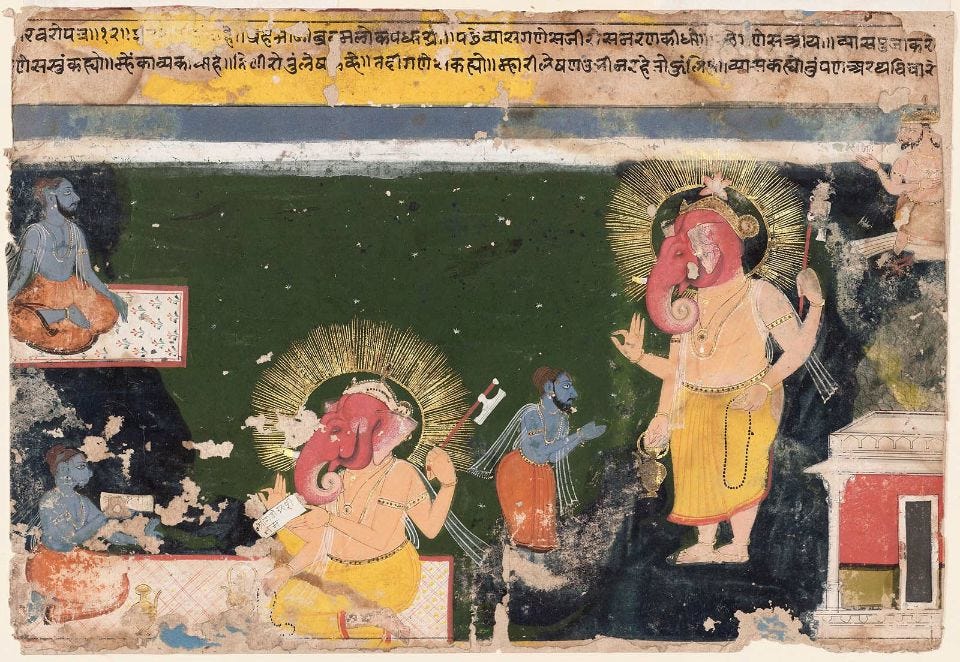Jayary Newsletter # 82

The Saviour
Here's where we left the story yesterday: the gods are worried that the killing of brahmins by the daityas will kill them too, for it's sacrifice that maintains the world and without the world, there's no heaven. The deities beseech Brahma to do something about the killing; Prajapati tells them to supplicate themselves before Agastya, for it's within the rishi's power to swallow the ocean and expose the kaleyas hiding beneath the waves.
The god's argument to Brahma echoes the hierarchy of power in the human world: yes, it's true that kings rule over their subjects and the farmer has to bow before his ruler, but it's even more true that without the farmer, there's no king. The top of the pyramid can't survive without the base.
When the gods reach Agastya's ashram, they recount how he's in the habit of saving the world from disaster. Didn't he do so when Nahusha was oppressing the world? Didn't he stop the Vindhyas from overshadowing the sun?
What they're trying to say is "we are in even bigger trouble now and only you can save us." I like how the burden of dharma is a rotating burden: sometimes it falls on gods who are importuned by rishis and humans, sometimes it falls on rishis who are importuned by gods and humans and sometimes it falls on humans who're importuned by rishis and gods. Dharma and karma are intertwined.
Modus Ponens
After Lomasha recounts Agastya's past as apocalypse averter and the god's successful attempt to enrol him once again he turns to Yudhisthira and says "that's why the wide mouthed Agastya came to the ocean shore."
Bad move.
Lomasha should have known that Yudhisthira is a like a curious child who will always pry open the why behind the why. Yudhisthira wants to know why Agastya saved the world from Nahusha and why the Vindhyas started growing higher and higher.
But first, a few words on modus ponens. It's a rule of logic that goes as follows: If A implies B and A is true, then B is true. Or a slightly different form: if you know A and you know that A implies B, then you know that B.
Children are experts at reverse engineering modus ponens. If you tell them B, they will ask "why B?" upon which the adult scrambles to invent another explanation, "because A implies B." But then the child asks "why A?" and the game goes on and on.
Yudhisthira is that child. If B = Agastya agreeing to swallow the ocean, he wants to know "why B?" Because, Lomasha says "He saved us on earlier occasions - such as when he stopped the Vindhyas from overshadowing the sun (A)."
You can't justify one fantastic achievement by quoting another; "A mountain wanting to overshadow the sun? How did that happen?" asks Yudhisthira.
A Mountain of Jealousy
Lomasha should have known that Yudhisthira wouldn't let him complete his story without filling in all the details. Now he has to tell the exiled king why the Vindhyas were so upset with the sun.
The sun was in the habit of paying homage to Mt. Meru. Every morning the sun would climb out of its cave and set out on a circular pilgrimage around the great mountain all day long. By evening time the sun would be tired and ready to rest until it was time to show bhakti the next day. The Vindhyas noticed the sun's devotion and were jealous.
Meru is a mystery to me. It's the centre of the universe but no one talks about it. Did Meru come before Prajapati or after? We don't know.
Anyways, the Vindhyas were upset with the sun. They asked him "why do you circumnavigate Meru and not us? Are we second class citizens?"
The sun didn't know what to say. "I am only doing what I have been commanded to by Prajapati. If you want my route changed you're going to have to register a complaint with my supervisor."
That angered the Vindhyas even more; they started growing and growing and blocking the sun from casting light on the earth. Farmers started losing crops for lack of sunlight. Brahmins stopped sacrificing for lack of supplies from the farmers. That's when the gods started worrying - heaven begins to teeter when sacrifices stop.
So the gods approached Agastya and said: "can you do something about the Vindhyas?"


